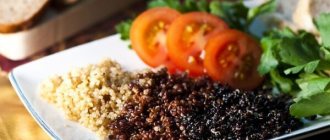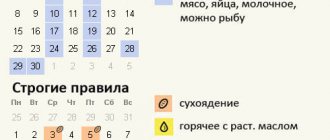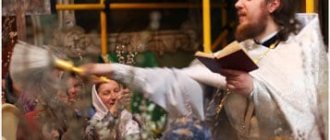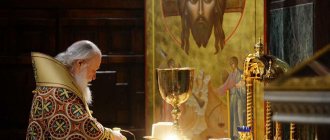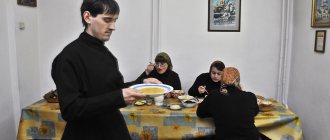| Period | Mon | W | Wed | Thu | Fri | Sat | Sun |
| Lent | without oil* | without oil* | xerophagy | no oil | xerophagy | With butter | With butter |
| Spring meat eater | fast | fast | |||||
| Apostolic post | fish | fish | With butter | fish | With butter | fish | fish |
| Summer meat eater | fast | fast | |||||
| Uspensky village : August 14-27 | without oil* | without oil* | xerophagy | no oil | xerophagy | With butter | With butter |
| Autumn meat eater | fast | fast | |||||
| Christmas post : 28 Nov. – Jan 6 | |||||||
| Nov 28–Dec 19 | fish | fish | With butter | fish | With butter | fish | fish |
| 20 Dec.–1 Jan. | With butter | With butter | without oil* | With butter | without oil* | fish | fish |
| Jan 2–6 | without oil* | without oil* | xerophagy | no oil | xerophagy | With butter | With butter |
| Winter meat eater | fast | fast | |||||
Dates are indicated according to the new style.
* This means that olives are used instead of vegetable oil.
The Charter fully applies to the monastic practice of Palestine (see “Fast according to the Typikon”). This table reflects current parish practice, which may vary depending on local traditions. The laity determine their norm individually, preferably with the blessing of the priest.
***
In the Russian Orthodox Church there are four multi-day fasts, fasts on Wednesday and Friday throughout the year (with the exception of five weeks, called continuous), and three one-day fasts.
Orthodox fasting calendar 2022
To find out what fast it is now, you need to open the church calendar. According to the rules of the Russian Orthodox Church, 4 long multi-day abstinence from food are planned for the 22nd year:
- 03/07-23/04 – Lent is the strictest fast in 2022. It lasts 48 days: includes 6 weeks of Pentecost and Holy Week before the Great Solemnity. The meaning of holy fasting and spiritual cleansing during it: preparation of the laity for Easter Sunday.
- 06.20-11.07 - the time of Peter's fast, which annually begins a week after the celebration of the Holy Trinity. It is scheduled for the summer months and will last 22 days in 2022.
- 08.14-27.08 – Lent in August, which in Russia is called Uspensky. It lasts for 2 weeks and serves as preparation for the laity for the Great Solemnity of the Assumption.
- 28.11-06.01 – time of multi-day Christmas abstinence from food, which lasts 40 days. By observing it, believers cleanse their body and soul of everything unnecessary and thereby prepare for the celebration of the Nativity of Christ.
In 2022, things will be like this with one-day posts:
- 18.01 – Orthodox Christians will celebrate Epiphany Eve; on this day it is allowed to consume only food that has undergone heat treatment with the addition of oil.
- 11.09 – one-day abstinence, which was established on the day of the Beheading of the Baptist of the Lord.
- September 27 – refusal of fast food, which occurs on an Orthodox celebration dedicated to the discovery of the Life-Giving Cross.
During the period between church fasts in 2022, it is recommended to abstain from animal products on Wednesdays and Fridays. This should be done at the time when the fast ends and before the next multi-day abstinence begins. At the same time, on major church celebrations that fall on Wednesday and Friday, the laity can eat fish.
The church calendar has 5 Continuous Weeks, which will take place on the following dates:
- January 7 - January 17, 2022
- February 14 - February 19, 2022
- February 28 - March 06, 2022
- April 25 - April 30, 2022
- June 13 - June 19, 2022
A synonym for Solid is omnivorous week (week). At this time, the laity do not abstain from fast food. With the permission of the Orthodox Church, they can consume animal products even on Wednesdays and Fridays.
Detailed food calendar, which is recommended to be followed in 2022:
| What they observe | Monday | Tuesday | Wednesday | Thursday | Friday | Saturday | Sunday |
| Easter Lent (Lent) 07.03-23.04 | Dry eating allowed | Food that has undergone thermal treatment. processing, without oil | Dry eating allowed | Food that has undergone thermal treatment. processing, without oil | Dry eating allowed | Food that has undergone thermal treatment. processed, with oil | Food that has undergone thermal processing. processed, with oil |
| Spring meat eater 20.06-11.07 | Fish day | Fish day | |||||
| Apostolic Fast (Peter's Fast) | Products that have undergone thermal treatment. processing, without oil | Products: fish | Dry food | Fish dishes | Dry food | Fish | Fish dishes |
| Summer meat eater | Dry eating allowed | Dry eating allowed | |||||
| Dormition post 14.08-27.08 | Dry eating allowed | Products that have undergone thermal treatment. processing, without oil | Dry food | Products that have undergone thermal treatment. processing, without oil | Dry food | Food that has undergone thermal treatment. treatment, diluted with oil | Food that has undergone thermal processing. processed, with oil |
| Autumn meat eater | Dry food | Dry products | |||||
| Christmas post 28.11-06.01 Three periods: 28.11-19.12 20.12-01.01 02.01-06.01 | Products that have undergone thermal treatment. processing, without oil | Dishes made from fish | Dry products | Dishes made from fish | Dry food | Fish dishes | Fish |
| Food that has undergone thermal treatment. processing, without oil | Products that have undergone thermal treatment. processed, with oil | Dry food allowed | Food that has undergone thermal processing. processed, with oil | Dry food allowed | Fish day | Fish day | |
| Dry eating allowed | Food that has undergone thermal treatment. processing, without oil | Dry food | Food that has undergone thermal processing. processing, without oil | Dry products | Dishes that have undergone thermal treatment. processed, with oil | Dishes that have undergone thermal treatment. processed, with oil | |
| Winter meat eater | Dishes made from fish | Dishes made from fish |
So how many fast days are there in a year? They number from 178 to 212, the number depends on the severity of abstinence and the health of the person.
How long does Lent last?
Lent lasts 48 days. It is the longest and strictest among the fasts established by the Church. Great Lent is called the Holy Lent in memory of the forty days that Jesus Christ spent in fasting and prayer in the lifeless desert, setting an example for all people with this feat, for “man will not live by bread alone, but by every word that comes from the mouth of God” ( Matthew 4:3-4).
After Pentecost itself (six weeks) comes Holy Week - the remembrance of the passions of Christ, which the Savior of the world voluntarily took upon Himself for the atonement of human sins. Holy Week ends with the main and brightest Christian holiday - Easter, or the Resurrection of Christ. The resurrection of Jesus Christ from the dead in the flesh is a prototype of the General Resurrection from the dead of all people on the day of the Last Judgment and the promise of eternal life prepared by God for all the righteous. For those who, fulfilling the commandments of Christ, “co-crucify” with Christ in their earthly life, waging spiritual warfare with their human passions and sinful lusts, and then “co-resurrect” with Christ after their physical death. The same meaning of co-crucifixion and co-resurrection with Christ is carried by Great Lent.
Post in January 2022
- Which dates in the first month of the year are considered fast: from 1, 2, 3, 4, 5, 6, 18, 21, 26, 28.
- Great celebrations in January fall on traditionally fast days (Holy Nativity, Circumcision of the Lord are celebrated on Friday, Epiphany on Wednesday). Therefore, abstinence from food will not be recommended.
- On what dates in January should you adhere to strict fasting: 5, 6, 18.
- What you can eat 1, 2, 3, 4, 21, 26, 28: fish and seafood are allowed.
- Lay people eat dry, uncooked food 3, 5, 6.
Children are not recommended to follow these rules. It is enough to limit their consumption of large amounts of sweets.
Christmas post
Lay people begin 2022 with dietary restrictions, which they began to observe at the end of November of the previous year. During the first six days of the new year, believers abstain from fast food.
How to keep the Nativity fast for the laity
There are many disputes in the Orthodox community about how to keep the Nativity fast for the laity. The reason is that the rules of fasting, which each of us has read at least once in calendars, magazines and on church websites, refer, as a rule, to the so-called monastic Rules. But a layman does not have to fast as strictly as a monk.
If it is difficult to maintain a strict forty-day fast, you should ask your confessor or just the priest you go to in the local church for an indulgence. What is relaxation? This means that your fast will not be as strict - due to your health or other reasons. After all, the meaning of the Nativity Fast is preparation for the holiday of the Nativity of Christ, fasting is not an “Orthodox diet”, it is a test for our spirit, which helps us see the main thing and cut off everything that is not important, focus on what the Gospel calls us to. Through self-restraint, become closer to the Lord.
On all days of the Nativity Fast, meat, dairy products and eggs are excluded from the Christian diet. The pinnacle of Lent, the Nativity of Christ, is preceded by January 6, which is also called “Christmas Eve.” This is the day of the strictest fasting - you can only eat bread, water and fruit. “Christmas Eve” comes from the word “sochivo”, sochivo is the faithful wheat, which is traditionally eaten on the eve of Christmas.
Post in February 2022
Among the fasting dates of the last month of winter are:
- Wednesdays falling on 2, 9, 23;
- Fridays corresponding to the dates 4, 11, 25.
The last day of the calendar winter will mark the beginning of Cheese Week. Starting from the first day of the week, abstinence from animal products is recommended.
Folk traditions of the Nativity Fast
In Rus', the Nativity Fast was also called Filippovka. The fact is that the fast (the last day of eating meat food before the start of one of the three - Rozhdestven, Petrov, Assumption - multi-day fasts) fell on the day of remembrance of the Holy Apostle Philip - November 27, according to the new style.
Filippov's day also had other names: Kudelitsa, Zagovenye, Zapusty or Launches among the Belarusians, Philip. Kudelitsa is the first week of spinning in Filippov fast. In the evenings and at night, with a torch, women carded, tugged, twisted, wound yarn and said: “A lazy spinner doesn’t even have a shirt.” “The spinning wheel is not God, but He gives you a shirt,” “If you don’t wear it in winter, you’ll have nothing to weave in summer,” “Don’t be lazy to spin, you’ll dress well.”
On Kudelitsy in the villages, the last weddings before Lent were played: the Church did not bless getting married during Lent. The “wolf month” begins on Philip Day: wolves gathered in packs and got close to the huts.
March
The first month of spring begins with Cheese Week. It is called pre-purification. The laity gradually begins to prepare the body for the beginning of Lent. In the first week of March, you should completely limit your consumption of meat and animal products.
Lent
An important date for the laity: Lent begins in 2022 - March 7. From this date until the end of the month during Easter Lent, believers will adhere to strict food restrictions.
What can you eat according to the Orthodox calendar, if there are no serious contraindications regarding human health:
- 7.03 – it is recommended to completely abstain from eating;
- dates when you need to stick to dry eating: 8, 9, 10, 11, 14, 16, 18, 21, 23, 25, 28, 30;
- food that has undergone heat treatment, but without adding oil, can be eaten on Tuesdays and Thursdays on the following dates: 15, 17, 22, 24, 29, 31;
- The laity eat food that has undergone heat treatment with the addition of oil on weekends: 12, 13, 19, 20, 26, 27.
Why should you fast?
Archimandrite Simeon Kutsas answers this question: “Christian life is unthinkable without feat. That is, without the effort that the faithful make, guided and strengthened by the Holy Spirit, to get rid of the yoke of sin and the domination of passions, and to selflessly follow the will of the Lord. To live in Christ and be a living member of His Body, which is the Church.
In this ascetic effort, fasting occupies a particularly significant place. It represents one of the most effective weapons in our spiritual struggle. The word of God testifies to this. This is revealed to us from the lives of the saints. This is what our Church believes and teaches, which perceives fasting as one of its most ancient and sacred institutions.
However, fasting, like other church institutions, especially in our days, is in danger of losing its meaning or becoming useless! And, unfortunately, this also happens among many of those Christians who zealously preserve and strictly fulfill the institutions of the Church.
So, some Christians - either through ignorance or carelessness - underestimate the importance of fasting and do not observe it. Others keep it to some extent, but do it formally. They do not have the necessary understanding of its deep meaning, they have no knowledge of what concerns fasting and what a conscious believer needs to know. Thus, observing fasting turns into a formal action that does not have the deep meaning that is invested in it by the faith and experience of the Church.”
Fasting is usually understood as food restrictions, but this is only one aspect of fasting, and far from the main one. You should not attach undue importance to menu planning and reading labels, so as not to accidentally ingest a product containing egg powder or powdered milk. The meaning of the post is completely different.
The task of fasting is to bring yourself into a state of spiritual concentration, free yourself from vanity and see sins in yourself that we usually do not notice; to reconcile with our neighbors, to take care of those who need our care and participation (often it is more difficult for us to do a good deed for our relative than for a stranger). It is very useful to set yourself some specific task for Lent, for example, to overcome the sin of condemnation, and devote maximum effort to it.
Restrictions on food, entertainment, watching TV and news feeds, surfing on social networks and attending entertainment events help us achieve spiritual concentration. The freed time should be devoted to prayer and spiritual reading. During Lent, many try to read the Psalter daily in addition to the usual prayer rule. It is good to set yourself the task of rereading the entire Gospel during Lent.
However, it is important not to go too far and not rush to the other extreme, condemning relatives who do not fast, burdening them with the responsibility of preparing Lenten food for us, arrogantly ignoring family holidays to which we were invited by relatives far from the Church. Fasting should not be put above love.
Lent in 2022
March 14 - Forgiveness Sunday March 21 - Triumph of Orthodoxy March 28 - Gregory Palamas April 4 - Week of the Cross April 7 - Annunciation of the Blessed Virgin Mary April 11 - St. John Climacus April 14 - Standing of Mary of Egypt April 17 - Praise of the Most Holy Theotokos (Saturday Akathist) April 18 - St. Mary of Egypt April 24 - Lazarus Saturday April 25 - Entry of the Lord into Jerusalem (Palm Sunday) May 2 - Holy Resurrection of Christ. Easter
“Fasting and prayer are two wings, and they cannot be separated in any way, for with one wing you cannot fly anywhere,” says Hieromonk Markell (Pavuk) “Whoever fasts without prayer, without reconciliation with his neighbors, can greatly harm his health. Every Sunday it is necessary to visit the temple of God and at least once a month to confess your sins and receive Holy Communion. Christ's Mysteries. Every time in the temple, as it were, a meeting of the general staff for the salvation of the soul is held, at which attentive people are given important instructions and grace-filled forces to put these instructions into practice.”
St. Augustine says: “If you are asked: why do you fast and torment yourself? answer: a mad horse that cannot be tamed with a bridle must be pacified with hunger and thirst.”
April
The lay people's nutrition calendar in April will be limited by strict rules: only food of plant origin is allowed. This month, believers celebrate three great celebrations.
These include:
- Annunciation (7.04),
- Palm Sunday (17.04),
- Bright Resurrection of Christ (24.04).
On April 7 and 17, you can indulge yourself: arrange fish days. 17.04 you can drink a small amount of red wine. April 16 (Lazarev Saturday) you are allowed to enjoy caviar.
Continuation of Lent
Strict abstinence must be adhered to during Lent 2022 on the following dates:
| Dates | What is allowed |
| 1.04 | Dry eating is allowed |
| 2.04 | Cooked food with added oil |
| 3.04 | Cooked food with added oil |
| 4.04 | Dry eating is allowed |
| 5.04 | Cooked food, no oil |
| 6.04 | Dry eating is allowed |
| 7.04 | Fish dishes |
| 8.04 | Dry eating is allowed |
| 9.04 | Cooked food with added oil |
| 10.04 | Cooked food with added oil |
| 11.04 | Dry eating is allowed |
| 12.04 | Cooked food without added oil |
| 13.04 | Dry eating is allowed |
| 14.04 | Cooked food without added oil |
| 15.04 | Dry eating is allowed |
| 16.04 | It is allowed to add caviar to the diet |
| 17.04 | Fish day, glass of wine allowed |
Holy Week
According to the church calendar, Holy Week begins on April 18.
For laypeople under strict restrictions, meals should be planned according to the following rules:
| Dates | What is allowed |
| 18.04 | Dry eating is allowed |
| 19.04 | Dry eating is allowed |
| 20.04 | Dry eating is allowed |
| 21.04 | Cooked food with added oil |
| 22.04 | Eliminate any foods from the diet, only clean water is allowed |
| 23.04 | You can drink water and eat bread |
How to spend the Nativity Fast?
Archpriest Igor FOMIN, rector of the Church of the Holy Blessed Prince Alexander Nevsky at MGIMO, answers:
Each person needs to determine his own measure of fasting. One can fast in full, and it will be good for him. Others, on the contrary, should weaken their fast.
Sick people can fast not as strictly as is written in the Charter. Illness is also a kind of fasting, humility of the flesh. In addition, for some diseases, a gastronomic fast can be harmful to your health. Listen to yourself, ask your doctor for advice.
Pregnant women have their own measure of fasting; in military personnel; for those who work in a stressful environment or study.
The most important thing that “you cannot eat during Lent” is your neighbors. I'm talking about anger, irritation, quarrels and any other negative behavior that destroys peace between people. After all, when we act badly towards our neighbors, we destroy the bridge between us and God. Of course, a special topic is children's fasting. Sometimes it is better to agree with children that during Lent they will, for example, eat less candy, than to impose restrictions on them in dairy and meat foods. In any case, with all doubts and questions about fasting, I advise you to approach your confessor or priest whom you trust.
June 2022: post calendar
In the first month of summer, believers will observe 4 one-day food restrictions, and from June 20 they will begin the important Peter's Fast.
Posts of one day
Schedule of fasts and meals:
On dates falling on Wednesdays and Fridays 1, 3, 8, 10, it is recommended to adhere to mild dietary restrictions. Fish, meat and animal products are prohibited.
Petrov post
Believers can consume fish dishes except for three dates: 22, 24, 29. For those observing strict abstinence on these dates, it is recommended to adhere to dry eating.
Advent fast for Catholics
The Nativity Fast among Catholics is in many ways similar in meaning to the Orthodox. In Western countries, Christmas is celebrated on December 25, and it is interesting that believers give a so-called “resolution” before fasting, that is, they indicate what and how they will limit themselves - whether in food or in some pleasures. The decree can also be a promise to do acts of mercy - go to nursing homes, make regular charitable donations, and much more.
Catholics also have such a concept as “Advent”. These are four Sundays before the Nativity of Christ, days when you need to be especially careful, reflect on why Christ came into the world and what His good news was to all Christians.
July
In the second summer month, the laity will celebrate two important celebrations: the Nativity of the Baptist and the day of the two apostles Peter and Paul, for which the Apostolic Fast is preparing.
Petrov fast in July
As for the consumption of animal products, they are prohibited until 11.07. It is allowed to eat fish dishes every day, with the exception of: 1, 6, 8. For people who are strictly abstinent, at this time they need to switch to dry eating.
Christmas post for children
The Nativity fast for children is a special, very delicate topic. What the children's fast will be like needs to be decided separately for each Orthodox family. It is best to do this together with a confessor who knows both the parents and the child and can give spiritual advice on what will be useful and what will not.
Children do not need to fast to the fullest extent of monastic fasting. After all, what is the main meaning of the Nativity Fast? In preparation for the Nativity of Christ, in the education of the soul. It is often much better to agree with your child that during Lent, for example, he will eat less sweets and not watch TV. Such a restriction will be a much greater feat for the baby, and this feat will have a deeper meaning than giving up meat, for example.
August 2022: post calendar
Among the great church celebrations it is necessary to highlight: the Holy Transfiguration (08.19) and the Assumption (08.28).
Dormition post
Abstinence from food will begin with the Honey Rescue, which is scheduled for August 14. For two weeks, believers abstain from food of non-plant origin. There will be only one fish day: it falls on the major Transfiguration celebration.
What does strict abstinence look like:
- dry eating is allowed every Wednesday and Friday (except for 19.08);
- On August 15 and August 22, you should also adhere to dry eating;
- heat-treated food without added oil is allowed 16, 18, 23, 25;
- Heat-treated food with added oil is allowed 14, 20, 21, 27.
The essence of the Nativity fast
The essence of the Nativity Fast, of course, is not only food restrictions, although they are also important. Starting from a gastronomic, bodily fast, a Christian advances in spiritual work - he learns to be responsible for his life through conscious self-restraint. Fasting in food is not an end in itself, but only a means to growth in Christ, another step towards the Lord and the fulfillment of His commandments.
The Nativity fast is also called Filippov, and in common parlance Filippovka. Why Filippov? The fact is that the eve of Lent (which is called the fast) falls on the day of remembrance of the Holy Apostle Philip - November 27, new style.
This is an Orthodox fast that was established in honor of one of the greatest events in the history of our faith - the Nativity of Christ, the day when the Savior came into the world to transform it and each of us once and for all.
The Nativity fast lasts from November 28 to January 6 inclusive - according to the new style. This is the last multi-day fast of the year, which ends the calendar year and prepares us for Christmas. This fast lasts forty days, like Lent. By the way, it is for this reason that he, like the Great One, is called the Pentecostal.
To better understand the essence of the Nativity Fast, every Christian should read the troparion and kontakion of the Feast of the Nativity of Christ, and even better, study the entire festive service, not forgetting the translation from Church Slavonic - in order to really understand what is sung about in the church.
Troparion, tone 4: Thy Nativity, O Christ our God, rise up the worldly light of the mind, in it for those who serve the stars as stars, I bow to Thee, the Sun of Truth, and Thou leadest from the heights of the East: Lord, glory to Thee! Translation: Your birth, Christ our God, gave the world the light of reason. Those who serve the stars (magi) from the star learned to worship You, the Sun of Truth, and to know You from the heights of the East. Lord, glory to You!
Kontakion, voice 3: Today the Virgin gives birth to the Eternal One, and the earth brings a den to the Unapproachable: the angels with the shepherds praise, and the wolves travel with the star: for for our sake the Young Child, the Eternal God, was born. Translation: Today the Virgin gives birth to the Eternal, and the earth gives a cave to the Inaccessible: Angels and shepherds praise, Magi follow the star: for our sake a young Child, the Eternal God, was born.
Photo www.flickr.com, Saint-Petersburg Theological Academy
(44
votes, average:
4.77
out of 5)
November 27, 2021
Authors: Elizaveta KIKTENKO, Igor FOMIN, archpriest, Svyatoslav SHEVCHENKO, priest
Share: 2
3
1
4
2
1 Comment
September
Among the important church celebrations in the first month of autumn are:
- 11.09 – Beheading of the Baptist;
- 21.09 – Nativity of the Mother of God;
- 27.09 – Exaltation of the Holy Cross.
Fast days in September
On every Wednesday and Friday you cannot eat animal products. On the Great Holidays of September 11 and September 27, you are also allowed to eat only plant foods.
If we consider the strict rules, then dry eating is recommended on Wednesdays and Fridays. Fish dishes are allowed on the Nativity of the Mother of God. On September 11 and September 27, heat-treated food with added oil is allowed.
Post in December
Of the important dates, it is necessary to note December 19 - Day of St. Nicholas the Wonderworker (Winter St. Nicholas).
Advent in December
Laymen must follow simple rules in the first winter month: they can eat fish dishes on all days of the month, with the exception of Wednesdays and Fridays (on these days only food of plant origin).
Those who strictly adhere to the regulations should pay attention to the following recommendations:
- dry eating is allowed on Wednesdays and Fridays;
- fish dishes are allowed on weekends and on the following dates: 1, 6, 8, 13, 15, 19;
- heat-treated food with added oil is recommended: 20, 22, 27, 29;
- heat-treated food without oil: 5, 12, 26.
Dates of the Nativity Fast
The time of the Nativity Fast is exactly 40 days. The fast begins on November 28 according to the new style and continues until January 6 inclusive. On the night of January 7, Christians finish fasting and meet the pinnacle of fasting, its main goal and meaning - the Nativity of our Lord Jesus Christ. In every fast, including Christmas, there is a conspiracy, otherwise - the eve of fasting. The beginning of the Nativity Fast falls on November 27, this is the day on which the Orthodox Church remembers the life of the Holy Apostle Philip. It is in his honor that the Nativity Fast is also called Filippov (popularly Filippovka). If the plot falls on one-day fasts (Wednesday or Friday), then it moves to the previous day.

